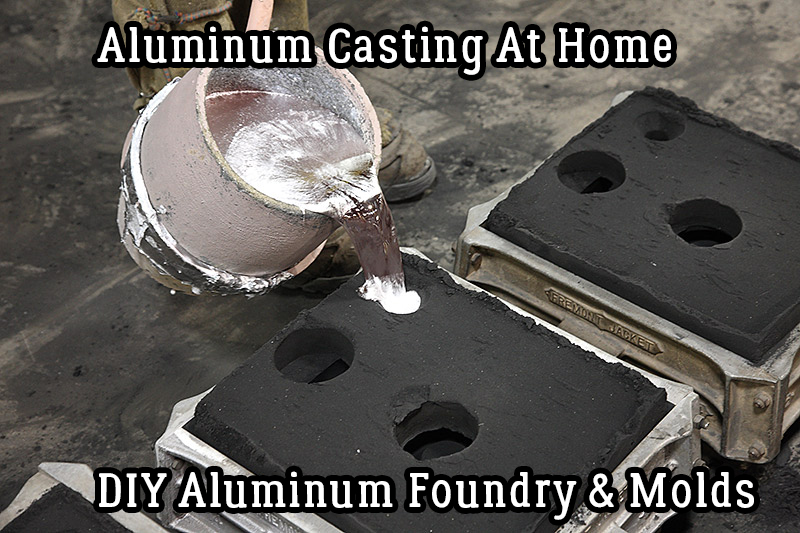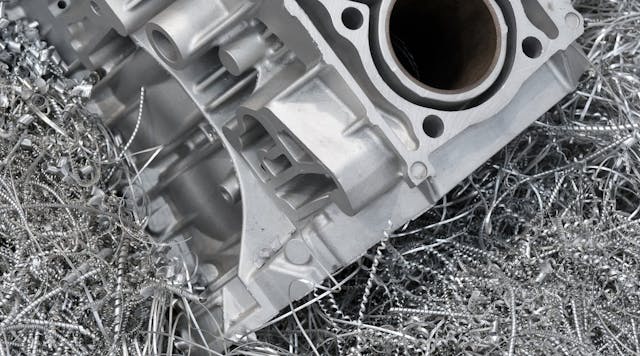The value of Aluminum Foundry Wisconsin in casting projects
Wiki Article
Understanding the Conveniences and Innovations in the Aluminum Foundry Market
The Aluminum Foundry industry plays a crucial function in modern manufacturing. Its lightweight buildings notably improve gas performance, particularly in vehicle and aerospace sectors. On top of that, Aluminum's resistance to corrosion assurances durability in numerous applications. As the industry progresses, developments such as sophisticated recycling and additive production are reshaping manufacturing approaches. Exploring these innovations discloses not just the benefits but additionally the obstacles ahead for Aluminum shops in a quickly altering market.The Lightweight Advantage of Aluminum
Aluminum's lightweight nature offers substantial benefits throughout various industries, particularly in production and transport. Its reduced density enables the manufacturing of parts that are easier to handle and mount, leading to decreased labor costs and enhanced performance. In the automotive field, lighter cars contribute to enhanced fuel economic situation and reduced emissions, aligning with global sustainability objectives. In aerospace, the use of Aluminum reduces the total weight of airplane, which is vital for improving performance and minimizing functional costs.Additionally, Aluminum's lightweight residential or commercial properties assist in ingenious designs that were formerly impractical with heavier products. This flexibility enables makers to create complex forms and frameworks while preserving structural stability. In general, the lightweight advantage of Aluminum not only enhances item efficiency however also drives developments in innovation and layout, making it a preferred material in numerous applications.
Deterioration Resistance and Durability
The Aluminum Foundry industry is renowned for creating materials with remarkable corrosion resistance, making them excellent for various applications. This residential property, incorporated with boosted structural honesty, adds to the lasting performance advantages that Aluminum parts provide. Therefore, sectors increasingly depend on Aluminum to meet demanding environmental conditions without compromising top quality.
Superior Deterioration Resistance
While different steels deal with substantial challenges from environmental elements, Aluminum attracts attention for its remarkable deterioration resistance, making it a favored choice in several applications. This residential property is largely due to an all-natural oxide layer that bases on the Aluminum surface, providing a barrier versus wetness and destructive agents. Unlike other steels that may corrosion or weaken with time, Aluminum keeps its honesty also in extreme settings, such as seaside locations or commercial settings. In addition, its lightweight nature integrated with deterioration resistance makes it optimal for applications in aerospace, auto, and aquatic markets. Overall, Aluminum's exceptional longevity not only improves item longevity however also lowers maintenance prices, offering a compelling benefit for suppliers and customers alike.Enhanced Structural Stability
Developers and designers significantly identify the relevance of enhanced structural integrity in contemporary applications, where both corrosion resistance and resilience are important. Aluminum alloys, recognized for their lightweight residential or commercial properties, likewise exhibit remarkable resistance to corrosion, making them appropriate for rough atmospheres. The innovative methods employed in the Aluminum Foundry market contribute substantially to producing components with boosted longevity. Advanced casting procedures and alloy make-ups are customized to meet certain performance demands, ensuring that frameworks can withstand extreme problems without endangering integrity. Surface area therapies and finishings boost the lifespan of Aluminum items, even more reducing degeneration over time. This focus on improved structural honesty not only prolongs the usability of products yet also reduces maintenance expenses, solidifying Aluminum's setting as a material of option in different markets.Lasting Performance Conveniences
Lasting performance in Aluminum components is largely associated to their exceptional rust resistance and durability. Unlike many metals, Aluminum normally creates a safety oxide layer, which stops rust and degeneration in different settings, consisting of marine and industrial settings. This inherent building substantially prolongs the lifespan of Aluminum items, lessening maintenance and replacement expenses. Furthermore, the lightweight nature of Aluminum boosts its applicability across industries without endangering stamina. The material's resistance to deterioration likewise contributes to its integrity popular applications, making it an excellent option for automobile, aerospace, and construction fields. As sectors progressively prioritize sustainability and longevity, Aluminum's efficiency benefits align with modern-day engineering demands, solidifying its role in innovative production procedures.Ecological Impact and Sustainability
 As the Aluminum Foundry market develops, it significantly prioritizes environmental influence and sustainability, recognizing the requirement for liable techniques in the face of climate adjustment. Initiatives to minimize waste and energy usage go to More Help the forefront, with many foundries embracing reusing initiatives to recover Aluminum scrap. This not just reduces basic material use yet also significantly reduces power expenditure, as recycled Aluminum needs just a fraction of the energy contrasted to main manufacturing.
As the Aluminum Foundry market develops, it significantly prioritizes environmental influence and sustainability, recognizing the requirement for liable techniques in the face of climate adjustment. Initiatives to minimize waste and energy usage go to More Help the forefront, with many foundries embracing reusing initiatives to recover Aluminum scrap. This not just reduces basic material use yet also significantly reduces power expenditure, as recycled Aluminum needs just a fraction of the energy contrasted to main manufacturing.In addition, improvements in discharges regulate innovations are being implemented to lower air contaminants, lining up operations with more stringent environmental laws. Factories are likewise checking out alternate power sources, such as solar and wind, to power their facilities sustainably. By promoting collaboration with stakeholders, the industry aims to develop cutting-edge solutions that boost environmental stewardship. Collectively, these initiatives highlight a dedication to lowering the Aluminum Foundry's carbon impact while promoting a round economic situation within the production industry.
Advanced Manufacturing Techniques
 Reinventing production processes, the Aluminum Foundry sector is progressively integrating innovative production methods to enhance performance and accuracy. Techniques such as computer system numerical control (CNC) machining and additive production have actually arised as necessary elements in enhancing manufacturing workflows. CNC machining permits for high-precision element manufacture, substantially decreasing product waste and production time. Additive production opens brand-new opportunities for complex geometries and light-weight styles that were previously hard to attain.
Reinventing production processes, the Aluminum Foundry sector is progressively integrating innovative production methods to enhance performance and accuracy. Techniques such as computer system numerical control (CNC) machining and additive production have actually arised as necessary elements in enhancing manufacturing workflows. CNC machining permits for high-precision element manufacture, substantially decreasing product waste and production time. Additive production opens brand-new opportunities for complex geometries and light-weight styles that were previously hard to attain.In addition, the release of automation and robotics in Aluminum shops streamlines procedures, reduces human error, and improves worker security. These technologies assist in an even more responsive production atmosphere, making it possible for suppliers to adapt promptly to market demands. The integration of sophisticated simulation software program even more improves the style and screening stages, causing superior product quality. Collectively, these methods not just boost functional performance but additionally foster development, positioning the Aluminum Foundry market at the forefront of contemporary manufacturing.
Innovations in Recycling Procedures
The Aluminum Foundry sector is not just progressing in manufacturing methods yet is also making considerable strides in reusing procedures. Innovations are emerging to boost the efficiency of recycling approaches, minimizing energy intake and improving sustainability. Advanced sorting innovations, such as automated optical sorting, make it possible for the recognition and separation of Aluminum from other products with high accuracy. This results in a better of recycled Aluminum, which is necessary for preserving the honesty of the last items.
Additionally, closed-loop recycling systems are being executed, enabling manufacturers to recycle Aluminum scrap within their own manufacturing processes. This lessens waste and promotes a round economic climate. In addition, research study right into new recycling strategies, such as hydrometallurgical processes, uses the possibility for recuperating Aluminum from intricate waste streams. These advancements not just add to reducing the carbon his response impact of the Aluminum Foundry industry however additionally boost its financial practicality in an increasingly ecologically aware market.
Applications Across Numerous Industries
Numerous markets are significantly recognizing the convenience and advantages of Aluminum Foundry items, bring about extensive applications throughout fields such as automobile, consumer, aerospace, and building goods. In the vehicle industry, Aluminum castings contribute to lightweight vehicle styles, boosting fuel efficiency and efficiency. Aerospace producers use Aluminum components for their strength-to-weight proportion, crucial for aircraft structures and parts.In construction, Aluminum is favored for its longevity and resistance to corrosion, making it optimal for window frameworks, roofing, and structural supports. Durable goods additionally profit from Aluminum Foundry items, as seen in cookware, electronics, and packaging, where lightweight and recyclable materials are important.
The flexibility of Aluminum Foundry strategies enables elaborate layouts and precise requirements, dealing with the varied needs of these industries. As an outcome, Aluminum Foundry products are ending up being integral to contemporary production procedures throughout numerous markets.
Future Patterns in Aluminum Foundries
As industries continue to advance, Aluminum shops are positioned to accept several key fads that guarantee to improve efficiency and sustainability. One prominent fad is the raising fostering of digital technologies, including automation and expert system, which improve procedures and enhance quality control. Furthermore, the push in the direction of sustainable techniques is leading foundries to spend in recycling technologies, greatly minimizing waste and power consumption. Another emerging fad is using sophisticated alloys and products, catering to the growing need for durable and lightweight parts across different fields (Aluminum Foundry). Moreover, the combination of additive production techniques is expected to change part style, supplying customization and lowering lead times
Another emerging fad is using sophisticated alloys and products, catering to the growing need for durable and lightweight parts across different fields (Aluminum Foundry). Moreover, the combination of additive production techniques is expected to change part style, supplying customization and lowering lead timesCooperation with research study organizations is also anticipated to drive innovation, as shops seek to develop brand-new procedures and products. Aluminum Foundry. Jointly, these trends show a transformative future for the Aluminum Foundry industry, lining up with broader objectives of sustainability and efficiency
Frequently Asked Inquiries
What Are the Common Expenses Related To Aluminum Foundry Manufacturing?
The typical costs associated with Aluminum Foundry production include basic materials, labor, power, devices upkeep, and overhead costs. These elements collectively affect the total economic investment needed for effective Aluminum casting operations.How Does Aluminum Contrast to Other Metals in Strength?
Aluminum, while lighter than many steels, shows outstanding strength-to-weight ratios. Compared to steel, Aluminum is less solid yet uses exceptional rust resistance, making it a positive option in applications where weight and longevity are essential.What Precaution Remain In Location in Aluminum Foundries?
Precaution in Aluminum factories usually include compulsory individual protective equipment, ventilation systems to control fumes, regular tools upkeep, training programs for staff members, and adherence to strict safety regulations to decrease dangers connected with molten steel handling.How Is Top Quality Control Managed in Aluminum Casting Processes?
Quality control in Aluminum spreading processes involves rigorous inspections at various stages, including resources evaluation, procedure monitoring, and end product screening. Methods such as analytical process control and non-destructive testing warranty adherence to sector standards.What Certifications Are Essential for Aluminum Foundry Suppliers?
The value of qualifications for Aluminum Foundry providers consists of ISO 9001 for top quality management, ISO 14001 for environmental administration, and industry-specific criteria like ASTM and SAE, guaranteeing conformity, safety and security, and dependability in making processes.The Aluminum Foundry go to website industry plays a crucial role in contemporary production. The Aluminum Foundry sector is renowned for generating materials with superior rust resistance, making them suitable for numerous applications. Revolutionizing production processes, the Aluminum Foundry market is progressively incorporating innovative production techniques to enhance effectiveness and accuracy. The Aluminum Foundry industry is not only advancing in manufacturing methods yet is likewise making significant strides in reusing procedures. As industries continue to advance, Aluminum factories are positioned to welcome a number of vital patterns that assure to boost effectiveness and sustainability.
Report this wiki page